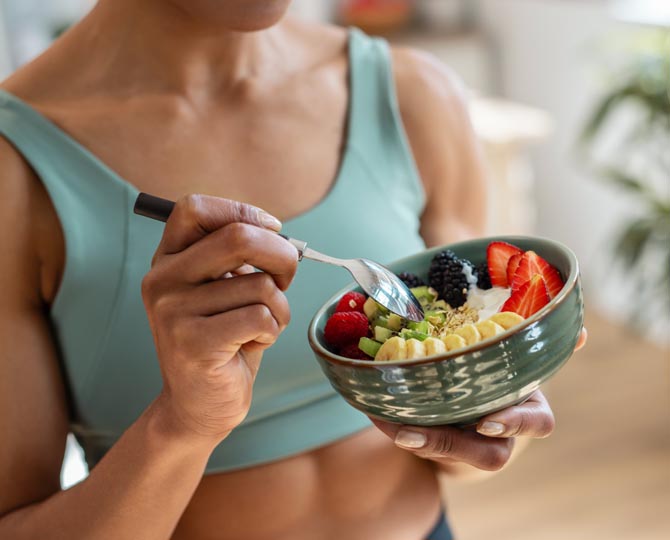Sports nutrition is essential for both professional athletes and fitness enthusiasts. As with all nutritional advice, the recommendations here should be introduced gradually. The amount and intensity of exercise should also be increased gradually to avoid injury, whether a person is exercising for strength or endurance. Advice from health professionals such as kinesiologists and physiotherapists is highly valuable, especially when it comes to nutrition. Let’s take a look at the nutritional recommendations for different types of exercise.
Case #1: Nutrition for endurance athletes (long-distance runners, swimmers, cyclists)
Endurance athletes need to eat the right foods in the right amounts to optimize performance and have the energy they need during exercise (3). Carbohydrates are a key macronutrient because they provide the body with glycogen, which is stored in the liver and muscles and used during exercise (3). Carbs include simple sugars (fruit, maple syrup, honey, sugar) and complex carbs (bread, rice, pasta, potatoes, oats, quinoa, legumes) (3). Depending on the exercise type and duration, the general rule is to aim for 70% of total daily calories to come from carbs (compared to 45–65% for a healthy adult) (3). Endurance athletes can also aim for 8–10 g of carbs per kg of body weight per day, depending on the duration of exercise (3, 5).
Protein is also an important macronutrient for endurance athletes. It helps build and repair muscle mass and is a source of energy (calories) (3). The recommended intake for endurance athletes is 1.2–1.4 g/kg/day (compared to 0.8–1 g per day for healthy adults) (3, 5). Protein sources include meat, poultry, fish, seafood, legumes, tofu, dairy products, nuts, and seeds.
Endurance athletes also need fats in their daily diet (3). Fats are a source of energy and help synthesize thyroid hormones, which influence adaptation to exercise. Fats also promote the absorption of fat-soluble vitamins A, D, E and K (3). For endurance athletes, 30% of daily calories should come from fats (3). Fat sources include nuts, seeds, avocado, oils, and oily fish.
What to eat before, during, and after exercise
Endurance athletes should consume carbs before exercise, adjusting the amount based on how close they are to exercising (4). If exercise is more than two hours away, athletes should add a protein source to ensure satiety (4).
| Time before exercise | Target nutrients |
| 3–4 hours | Normal meal with no fried foods or fatty sauces |
| 2–3 hours | 1 high-protein + 3–6 high-carb foods |
| 2 hours | ½ high-protein + 2–4 high-carb foods |
| 1 hour | 2–3 high-carb foods |
| 30 minutes | 1–2 high-carb foods |
For exercise lasting more than 60 minutes, athletes should consume simple carbs (applesauce, gels, sweets or sports drinks) during exercise (4). Specifically, 30–60 g of carbs/hour is recommended for exercise lasting 1–2½ hours, and 60–70 g/hour for exercise lasting more than 2½ hours (5).
After exercise, athletes should eat a meal or snack that includes carbs and protein (4). They should aim for 1–1.5 g of carbs per kg of body weight and 0.2–0.4 g of protein per kg of body weight (5).
Water
Endurance athletes need to stay hydrated to replenish water lost by breathing, sweating and urinating (3). They should drink water before, during and after exercise (3). The total recommended intake is 2.7 litres per day for women and 3.7 litres per day for men (3).
Case #2: Nutrition for strength athletes (weight trainers, weightlifters, and so on)
Nutrition is equally important for strength athletes to maintain physical health and athletic performance (1).
The recommended carb intake for strength athletes is approximately 4–5 g/kg of body weight per day or 55%–60% of total calories (3). This is slightly lower than for endurance athletes.
Protein is key for strength athletes because of its role in muscle protein synthesis. The scientific community is still debating the amount needed, with some data recommending 1.6–1.8 g/kg of body weight per day and others suggesting up to 2 g/kg of body weight per day. There are also recommendations that 15%–20% of total daily calories should come from protein (4).
As mentioned above, fats provide the body with energy and support cell growth (2). It’s important for strength athletes to consume healthy fats in adequate amounts (2). Fats should make up the remaining 20%–30% of total calories for strength athletes (4).
What to eat before, during, and after exercise
Strength athletes should consume carbs before exercise to replenish glycogen stores, which provide energy for use during exercise (2). For protein, studies suggest that taking supplements of BCAA (a type of amino acid) before strength training can reduce muscle soreness and help maintain muscle mass (1).
During high-intensity strength exercise, it’s usually recommended to consume drinks and/or snacks that provide 1–1.5 g of carbs/kg of body weight per hour.
After resistance training, athletes should consume a high-quality protein source to promote muscle growth and aid in recovery (1). The amounts are similar to those for endurance athletes. Studies suggest that protein has an overall effect on muscle growth for 24 hours after exercise (1).
Case #3: Nutrition for bulking
For people trying to build muscle, all of the above nutrients are important, as is total calorie intake (2). Additionally, a calorie surplus is recommended to promote muscle gain. Of course, the target calorie intake will vary from person to person depending on many factors, including gender, weight, height, and exercise type, frequency and goals (2). To promote healthy weight gain, people should focus on including quality foods in their diets.
Here are some tips on how to increase total daily caloric intake:
• Aim for three full meals a day that include carbs, protein and fats
• Follow meals with a nutritious dessert, such as homemade energy balls, nuts, Greek yogurt, or a glass of milk or soy beverage
• Eat two or three snacks a day that contain carbs and protein
• Add fats to meals and snacks, such as oils, salad dressings, sauces, avocado, hummus, nuts, and cheese.
Conclusion
Athletes of all kinds need to focus on the carbs, proteins and fats in their diet and adjust them based on the type of physical activity they’re doing. The target amounts will vary depending on the type of exercise. Optimal intake before, during and after exercise is also important. For people who want to build muscle, protein is key, as is an adequate total calorie intake.
Of course, this article only outlines general recommendations for sports nutrition. Athletes should seek personalized nutritional advice to meet their individual needs based on their exercise routines and circumstances.
References:
- Amawi et al. (2024) Athletes’ nutritional demands: A narrative review of nutritional requirements. Front Nutr Jan 18;10:1331854. https://pubmed.ncbi.nlm.nih.gov/38328685/
- ISAA. Bodybuilding Nutrition: What to Eat for Bulking (2024), accessed online, https://www.issaonline.com/blog/post/bodybuilding-nutrition-what-to-eat-for-bulking
- ISSA. Endurance Athlete Diet: What to Eat for Optimal Performance (2025), accessed online, https://www.issaonline.com/blog/post/nutrition-for-endurance
- Nutrition, sport et performance (2009), Marielle Ledoux, Natalie Lacombe and Geneviève St-Martin, 2e édition
- Vitale and Getzin (2019), Nutrition and Supplement Update for the Endurance Athlete: Review and Recommendations. Nutrients Jun 7;11(6):1289. https://pmc.ncbi.nlm.nih.gov/articles/PMC6628334/
- Schoenfeld, B. J., and Aragon, A. A. (2018). How much protein can the body use in a single meal for muscle-building? Implications for daily protein distribution. Journal of the International Society of Sports Nutrition, 15(1), 10
This article provides general information only and does not replace the recommendations or care of a health professional.

